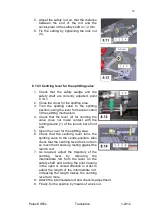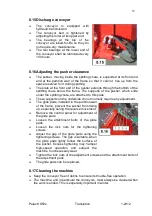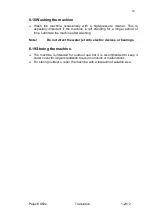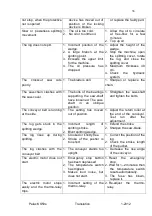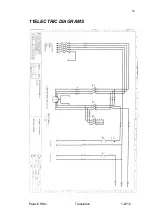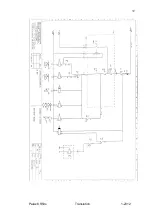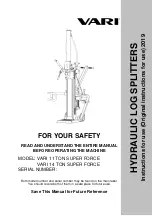
Palax KS50s
Translation
1-2012
25
To tighten the saw-chain, loosen the
attachment nuts (1) of the saw-bar (Fig.
8.1) and turn the tightening bolt (2)
clockwise.
To remove the saw-chain, turn the
tightening bolt (2) counter-clockwise until
the chain slackens.
The chain needs to be tightened enough
to prevent it from sagging under the saw-
bar.
Finally, tighten the attachment nuts of the
saw-bar.
Check the chain for tightness at regular
intervals.
Working with a blunt or damaged saw-chain is utterly uneconomical. Clean
up and check the saw-chain. Make sure that there are no cracks in the chain
links and that all the rivets are intact. If the chain is damaged or worn out, it
must be replaced.
8.1.2 Servicing the saw-chain
If the saw-chain will not be used for a while, clean it up using a brush and
immerse it in oil or photogen.
Always after re-sharpening, clean up the saw-chain thoroughly, remove from
it any stuck chips or grinding dust and immerse it in oil.
Cutting teeth
Use only special saw-chain files!
Saw-chain pitch 0.404"; gauge 1.6 mm; length 75 links.
Checking the saw-chain pitch: t = the distance over three rivets divided by
two.
The standard filing angle is 30˚.
The angles must be the same on all the cutters of the saw-chain. If the
angles are uneven, the saw-chain will rotate unevenly, will wear more
quickly and may even break.
All cutters must be the same length. If the cutters are not the same length,
they will have different heights. This makes the chain run roughly and
possibly crack.
The required sharpening results can be met only after sufficient and
constant practice. Use a file holder! As required, turn to a professional.
Depth gauges
The depth gauge determines the height at which the cutter enters the wood
and thus the thickness of the chip removed. The depth gauge setting is
reduced when the chain is sharpened. Use the filing gauge to check the
setting. If necessary, file using a flat or triangular file.
The distance between the depth gauge and the cutting edge = 0.65 mm.
While sawing coniferous trees, the setting can be increased by 0.2 mm,
except in frost.






















